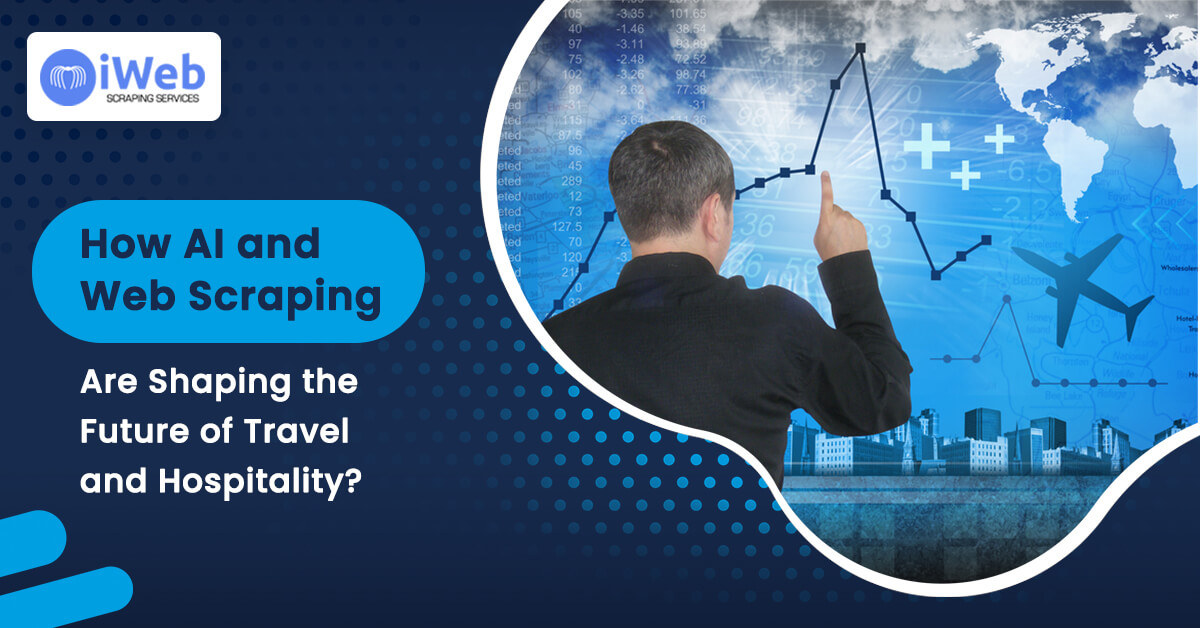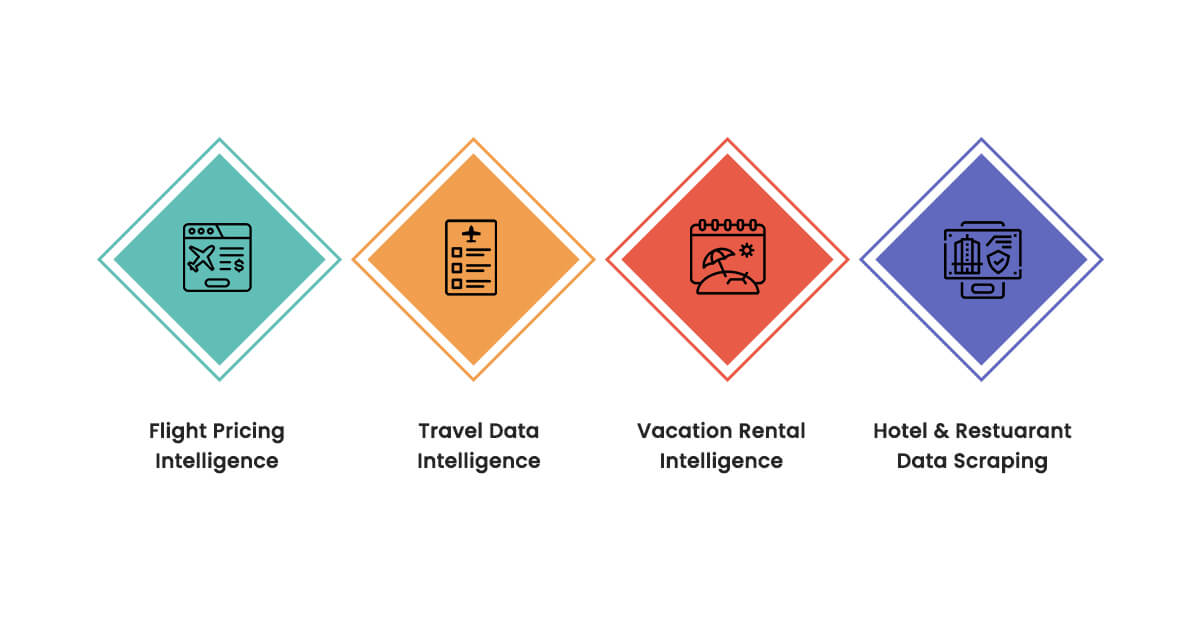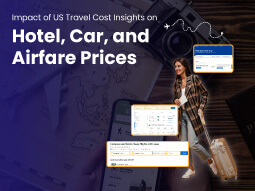How AI and Web Scraping Are Shaping the Future of Travel and Hospitality?

Travel and Hospitality businesses are consumer-facing, competitive, and price-sensitive businesses. Therefore, providing the best prices, greatest amenities, and top-class services for exceptional CX are the only ways these sectors can beat the competition. This is where utilizing the insights achieved from data analysis can help them create new deals, set competitive pricing, or introduce innovative products and services. Travel Data Web scraping helps them collect real-time data for insights and artificial intelligence automates the data analytics part.
This article explores the benefits and ways travel and hospitality businesses leverage AI and web scraping to help you attain the business goals of your travel business.
What is Web Scraping in the Travel & Hospitality Industry?
It’s no news that the travel industry is highly dynamic and competitive. The 12.1% rise from the previous year in the sector’s contribution to the world’s economy clearly shows that this competitiveness is going to become more fierce. Offering personalized services to beat the competition is only possible when businesses have deep insights about their competitors and customers.
To their rescue, web scraping facilitates collecting a massive amount of information in real time from multiple web sources productively. Then, AI analyzes these vast amounts of data which is further used to customize marketing campaigns and optimize pricing based on current market conditions of the travel industry.
Travel and hospitality web scraping is a method or technique of data extraction using a computer software program to obtain information like flight prices, flight availability, hotel data, hotel listings, and travel reviews from travel websites and online travel agencies.
In case, your travel company needs crucial data for analysis, manually copying data is time-consuming and complex. Hence, this automated process will help you access the platforms and websites using web scraping technologies to collect data that is available ethically in multiple formats on multiple platforms, which is huge in amount.
For instance, if a hotel brand wants to carry out sentiment analysis using customer feedback and reviews on different platforms. They can approach a web scraping company to get access to the data that is collected, cleaned, and ready for analysis according to their requirement.
However, there are potential risks associated with data scraping. Therefore, it is imperative to understand the compliances laid by the authorities, websites that you want to scrape data from, and other guidelines that can pose a challenge for data scraping. Thus, it is advisable to hire data scraping companies that understand these risks and follow compliance regulations.
Once the data is collected, travel companies use AI to analyze, forecast, and make recommendations to improve travel services.
Travel Intelligence Areas Fuelled By AI And Web Scraping

These intelligence domains are essential for the data analysis needs of the tourism sector. The specific data types scraped in each of these areas will take your business ahead of its competitors and add to your potential to become an industry leader. Hence, this section highlights various useful data types you can explore.
light Pricing Intelligence
Travel companies use flight price intelligence to implement dynamic pricing strategies, offering competitive fares to customers while optimizing profits. By tracking competitor prices and availability, businesses can adjust their pricing models to attract more bookings or increase margins during peak demand periods. Travel companies like Skyscanner and Kayak employ flight intelligence to help users compare flight prices in real time and more. You can use Google Flight API to monitor airfare prices. The following data types are most useful for travel businesses:
- Real-Time Price Tracking :You can scrape up-to-date flight prices from multiple airlines and online travel agencies (OTAs) to monitor fluctuations and trends.
- Competitor Fare Comparison :Gathering data on competitors’ pricing for the same or similar routes enables airlines and OTAs to adjust fares.
- Seat Availability :To learn about capacity and demand, you can scrape data on seat availability for different classes (economy, business, and first) across airlines.
- Fare Class Information :You can access data on different fare classes and restrictions (e.g., non-refundable, change fees) to analyze competitive offers.
- Price Trends and Forecasting :Travel businesses can use AI to analyze historical pricing data and predict future pricing trends, helping customers find the best time to book.
Travel Data Intelligence
This intelligence allows businesses to tailor their marketing efforts, create personalized travel packages, and predict future trends. By understanding traveler behavior and preferences, your travel business can offer more relevant services, optimize its operations, and stay ahead in a competitive market. AI and Web Scraping companies like iWeb Scraping offer the following data insights for the travel sector:
- Travel Demand Trends: Travel companies get insights on booking patterns, search engine data, and social media mentions to detect emerging travel trends and popular destinations.
- Traveler Preferences: Scrape reviews and feedback that AI further uses to analyze customer behavior, such as most frequently booked destinations, types of travel (solo, family, luxury, adventure), and preferred accommodation types.
- Customer Demographics: Scrape demographic data from surveys, customer profiles, or public sources to create segments based on age, location, spending habits, and travel frequency.
- Destination Insights: Collect data on local events, festivals, or seasonal activities that attract tourists to specific destinations, helping companies offer tailored travel packages.
- Booking Window Analysis: You can analyze the average lead time between bookings and travel dates to optimize marketing strategies and promotions for different customer segments.
Vacation Rental Intelligence
This data helps businesses adjust their pricing strategies for vacation rentals, enhance customer satisfaction by improving services based on guest feedback, and optimize property listings to match customer preferences. It also enables businesses to capitalize on trends such as seasonal demand or emerging travel destinations. You can access the following data analytics that empower short-term rental businesses to maximize their profitability:
- Rental Pricing: Scrape real-time rental prices from platforms like Airbnb, Vrbo, and Booking.com to monitor competitive pricing for different property types.
- Property Availability: Extract data on the availability of vacation rentals across different locations and periods to analyze supply and demand.
- Occupancy Rates: Use AI to track occupancy rates of vacation rentals across regions and seasons to inform pricing strategies and property recommendations.
- Booking Trends: Analyze booking trends for vacation rentals, including preferred seasons, length of stay, and types of travelers (families, solo travelers, business trips).
Hotel & Restuarant Data Scraping
Travel agencies can utilize this information to provide the greatest meal suggestions to customers, resulting in a smooth and customized experience. Businesses can also enrich their trip itineraries with popular meal alternatives or strengthen their partnerships with Hotels & Restaurants by keeping an eye on consumer feedback and trends in dining preferences.
- Menu and Pricing Data: Access meal delivery services (like Uber Eats, Zomato, and Yelp) or restaurant websites to scrape menus and prices to keep an eye on what rivals are selling.
- Restaurant Availability and Reservations: Extract data on table availability, reservation policies, and popular dining times, especially for high-demand restaurants.
- Customer Reviews and Sentiment: Scrape reviews from platforms like TripAdvisor, Yelp, or Google Reviews to assess customer sentiment, quality of service, and popular menu items.
- Location and Proximity Data: Collect data on restaurant locations, proximity to popular travel spots or accommodations, and foot traffic data to offer better dining recommendations for travelers.
- Health and Safety Information: Scrape restaurant hygiene ratings or safety certifications, especially post-pandemic, to ensure safe dining recommendations.
How do Travel & Hospitality Companies Leverage AI And Web Scraping?
Increase Revenues with Dynamic Pricing Optimization
You must have observed that when you visit a particular OTA or airline platform, the prices keep changing if you approach them on certain days or hours a day. That is called dynamic pricing. When travel companies adjust their fare and hotel room prices according to market demand, it is called a dynamic pricing strategy. Hotel price monitoring has been a very effective strategy for travel companies like Agoda, AirBnB, and many others to draw customers during peak season times.
Thanks to AI-powered data scraping, which offers huge amounts of data from multiple sites, it provides a comprehensive market overview for companies to act accordingly. For instance, based on the data collected from multiple OTAs in real-time, airline companies can adjust fare prices, boosting sales on specific days in the week or during holiday seasons.
Stay Ahead using Real-time Competitor Analysis and Benchmarking.
Businesses can evaluate and modify their strategy by using web scraping, which offers a constant stream of competitive data, including airfare, hotel rates, and rental car prices. It gives your travel and tourist company the option to instantly extract information about the prices, promotions, availability, and customer reviews of your rivals. Using this real-time data that was obtained through web scraping, AI-based software applications can create performance benchmarks and identify areas for improvement.
Hotels, restaurants, and airlines can gain a competitive edge by using these analytics to quickly react to consumer opinions and market changes.
Offer Exceptional Customer Satisfaction with Accurate Customer Segmentation and Personalization
Imagine having a complete view of customer feedback, ratings, and comments on multiple forums and social media platforms. You can have a holistic view of customers like what they don't like about your services. Thus you can tailor your services or plan your next projects to stand out for your exceptional customer experience like Hilton Group.
AI algorithms analyze this scraped data from multiple sites to identify patterns and segment customers based on behavior, preferences, and needs. For instance, customers who frequently mention “family-friendly” in reviews, can be segmented differently than those focused on “luxury experiences.”Moreover, using AI, segmentation can be done in real time. By continuously scraping new reviews and analyzing recent interactions, businesses can maintain up-to-date segmentation.
Not only that, AI-powered sentiment analysis tools can assess customer sentiments in reviews and ratings, classifying feedback as positive, neutral, or negative. This helps brands like Hilton to understand emotions and specific desires expressed by customers. Based on sentiment analysis, you can also extend personalized recommendations and services. For instance, if a customer’s review history shows a preference for “quiet locations” and “scenic views,” personalized offers at your travel website can reflect these desires.
Make your Business Future-Ready with Precise Trend and Market Forecasting
If you are only starting, data extraction can be of great help in making your way to the travel industry. Accessing real-time data to predict customer preferences, seasonal demands, trending destinations, and pricing strategies, you can forecast and become future-ready with precise information. For instance, by scraping aggregate reviews and travel forums information, you can identify the surge in demands for any specific destination.
If you plan to start a travel agency, you can use web scraping to aggregate reviews and travel forum data. Further identifying surges in interest in emerging destinations (e.g., increased mentions of eco-tourism or remote work destinations) can help. With such insights, your agency can adjust its marketing efforts to feature these destinations prominently, secure early partnerships, and offer unique packages. This proactive approach allows businesses to capture market share in growing travel niches, positioning them as trend leaders.
Challenges Travel/Hospitality Companies Face With AI And Web Scraping Implementation
While AI-powered data extracting is a great tool to make informed decisions and achieve business goals effectively, there are a few challenges associated with it. Firstly, there are compliance and strict privacy laws based on the region in which you operate. Non-compliance can raise legal concerns. Another challenge is data quality and data consistency. Using robust infrastructure can help overcome this challenge. Lastly, integrating AI with web extraction demands expertise in both machine learning and NLP technologies. Hence, dedicated teams with data scraping and AI expertise like iWeb Scraping can help you get the maximum out of your investment in analytics.
Future Outlook
The innovation of data extraction and AI will play a key role in transforming the travel industry. The growing trend of hyper-personalization will be powered by real-time web scraping and AI. Travel agencies and hoteliers can create unique and tailored journeys for their customers. Most importantly, web scraping will fuel the emerging trends of AR, VR, and IoT in the travel industry.
Taking Augmented Reality to the Next Level
By scraping location-based data and user-generated content, AR applications can provide contextual information to users. For example, scraping historical facts, reviews, and images of landmarks can enhance AR experiences in tourism by overlaying relevant data onto real-world locations, collecting data on user preferences and interactions allowing AR apps to tailor experiences, and recommending activities or enhancements based on scraped user feedback and reviews.
Fueling VR
Data scraping can gather insights from social media, travel blogs, and customer reviews to identify popular destinations and experiences, allowing VR developers to create immersive simulations that reflect users' interests.
Predictive Maintenance of IoT devices
IoT devices in travel, such as smart luggage or vehicles, can scrape data from various sources (like user reviews and service reports) to predict potential failures. It can be used to schedule maintenance proactively.
Final Words
Thanks to AI and web scraping technologies playing a crucial role in the travel sector offering analytics backing informed decision-making to improve client experiences and streamline operations. This technological advancement is changing how travel companies make decisions to increase revenues, secure competitive position, and innovate. The industry's continued adoption of AI in web scraping is showing itself in increased productivity, individualized services, and creative solutions to the ever-changing demands of modern tourists.
Looking for high-quality travel and hospitality data for informed decision-making? Look no further than quality data scraping services from iWeb Scraping. Contact our team for all your industry-specific data analytics requirements, today!




